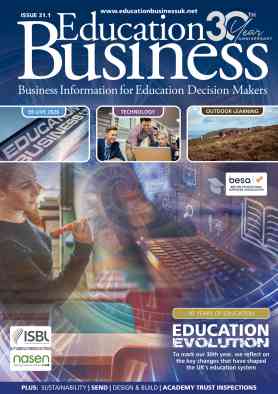
Ofsted’s new approach to SEND inspections
How is Ofsted intending to improve how it inspects the SEND and alternative provision sector, following the Big Listen consultation?
The ‘Big Listen’ consultation was published earlier this year in an effort to respond to calls for drastic changes to be made to Ofsted.
The consultation gave professionals, children and learners, parents, carers, and the public an opportunity to give their feedback on how Ofsted operates.
One of the biggest concerns that drove Ofsted to conduct the ‘Big Listen’ was that they were not meeting the needs of children and young people with special educational needs and disabilities (SEND).
It said in the report: “We will increase our focus and scrutiny on how providers are meeting the needs of children and young people with vulnerabilities such as socio-economic disadvantage and special educational needs and/or disabilities (SEND).”
Ofsted added that SEND provision is in their top five priorities for change.
Ofsted chief inspector, Sir Martyn Oliver, said: “I promised the Big Listen would be followed by real change. This is the beginning of a new chapter for Ofsted as we reset our priorities, refine our practices and rebuild our relationships. We want to retain the confidence of the children, parents and carers we work for, and regain the respect of the committed professionals we work with.
“We will always strive for higher standards for children, particularly the most vulnerable children. We share that aim with thousands of brilliant people working in education and social care. We are determined to win back their trust and work together in the interests of children and learners.”
Education Business looks at what criticisms have been made and how Ofsted has said it will address these concerns.
Private equity firms
One of the ways Ofsted said it will change is by tackling how private equity firms are often capitalising on vulnerable children’s lives.
It said: “We are aware that some registered children’s homes have become an investment vehicle for private equity, often based overseas. These companies also own much of the fostering agency market, as well as hundreds of SEND providers and independent special schools.
“This means some firms can profit from multiple aspects of a vulnerable child’s life: their home, their school, their additional support, or their move into foster care.”
Ofsted added that while many private firms do a good job, they are “worried about the risks of so many services supporting vulnerable children being held in so few private hands.”
In the report, Ofsted said one way to improve the situation is to “hold to account those who look after the most vulnerable children. It added that it does “not have the right tools to regulate” these private companies, and want to work with the government “to improve the oversight of these groups through upcoming legislation.”
The local SEND inspection debate
Another aspect of provision that ‘the Big Listen’ examined was area SEND services, with the acknowledgement that they need to identify where local areas need to improve, then make sure local leaders are supported to do this.
Prior to the consultation, many parents and carers argued that their biggest frustrations were with the system itself.
Ofsted used this as a reason for inspections to continue across local areas, and said that inspection in these areas is “critical”.
It said: “We need to find these issues and highlight them, whether they are local, regional and/or systemic national problems.
“We undoubtedly need to improve how we inspect the SEND and alternative provision (AP) sectors. We will call for improvement at all levels, whether that is at provider, local authority or national government level. We need to make sure the whole system puts the most vulnerable children first.”
Attendance
Ofsted also cited “a growing population of severely absent children” as another concern. The inspectorate said it suspects many children are missing school because they are vulnerable and are in and out of both registered and unregistered AP.
It said the government’s upcoming legislation to introduce a ‘children not in school’ register is needed to curb the issue so they can use that data to inform new annual attendance and off-rolling reviews, as set out in the government’s manifesto to address this growing crisis.
There are an estimated 20,000 pupils placed in unregistered alternative provision (AP).
“Through our unregistered schools investigations,” Ofsted said, “we have found too many unregistered providers that operate in appalling conditions. We have found some run by people with criminal backgrounds, and some we fear may be grooming young pupils for gangs.
“In the vast majority of cases, children are placed in these settings by local authorities and schools, despite children not receiving suitable education or support in them. We want to work closely with the government to end this unregulated market once and for all.”
Ofsted added: “We will use every tool at our disposal to raise standards in SEND provision and AP. Last year, we started inspecting full-time online education providers. We do this through a voluntary accreditation scheme overseen by the Department for Education. This is part of making sure that there is oversight of the education of all vulnerable children. Some of these online providers cater for children with the most complex needs.”
Ofsted Academy
Ofsted also said it was establishing the Ofsted Academy to improve SEND training and to recruit SEND specialists from the sector.
It said: “We aim to make sure no inspector goes into a mainstream school, special school or AP without a deep understanding of what good SEND provision looks like. We will also consult on including a new ‘inclusion’ criterion under the reformed education inspection framework.
“This will evaluate whether schools are providing high-quality support for disadvantaged and vulnerable children, including those with SEND.”
Further Information:Latest News
10/02/2026 - 09:47
Spending on schools across Scotland has increased by more than £1 billion in real terms over the past decade, statistics show.
10/02/2026 - 09:34
New training to empower school staff to improve mental health and wellbeing support for neurodivergent students has been launched by Anna Freud, a mental health charity transforming care for children and young people.
09/02/2026 - 09:58
Data from BAE Systems’ annual Apprenticeship Barometer found that 63% of parents said they would prefer their child to choose an apprenticeship over a degree after school.
06/02/2026 - 09:59
The work builds on guidance launched by Cardiff Council in autumn 2025, which provides clear and practical advice for schools responding to incidents where weapons are brought onto school premises.
05/02/2026 - 10:40
Schools are invited to take part in a practical, hands-on roundtable at Education Business LIVE 2026, exploring the complex relationship between wellbeing, attendance and behaviour in schools.







